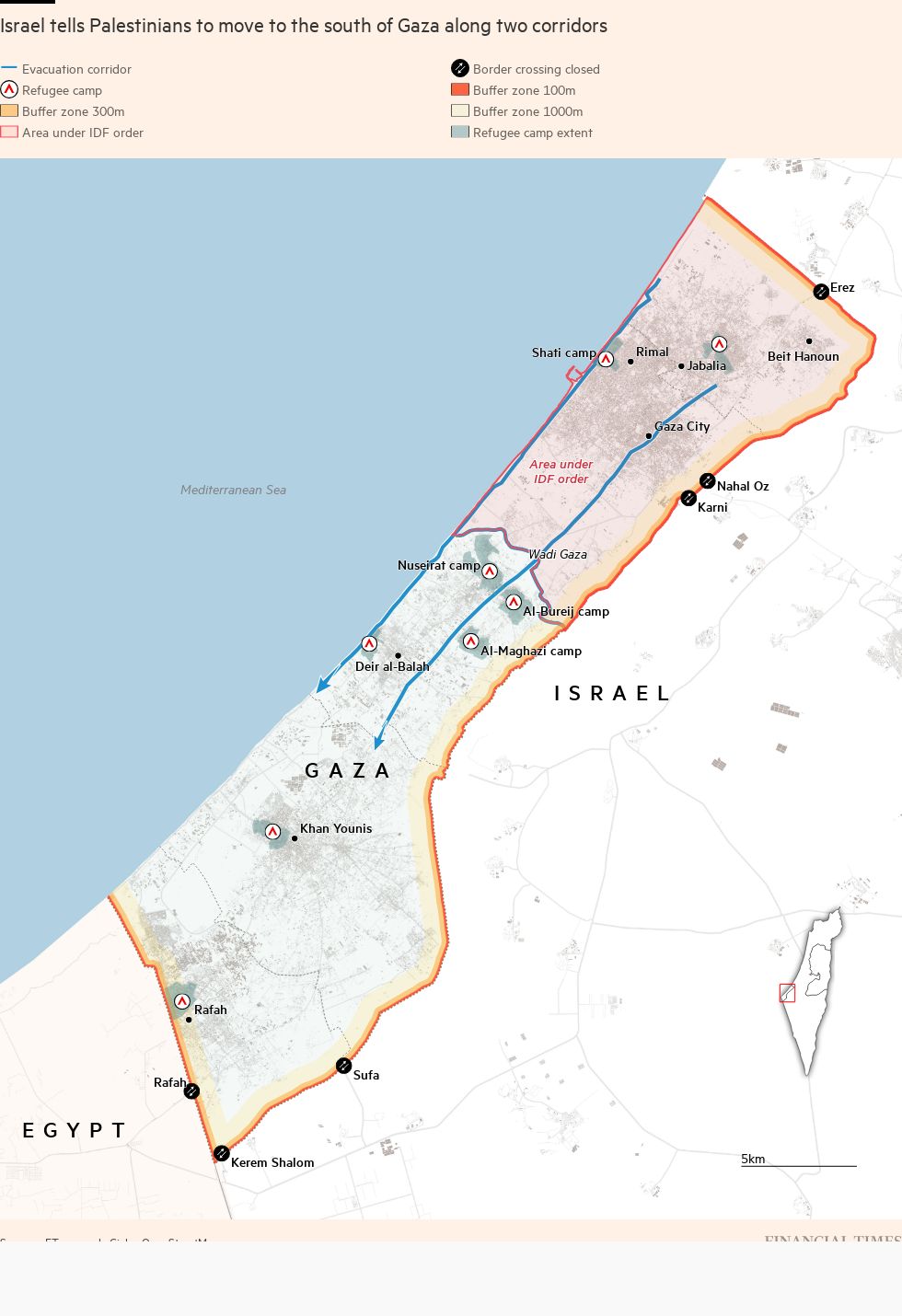[ad_1]
The US has held back-channel talks with Iran to warn the Islamic republic against escalating the war between Israel and Hamas into a broader regional conflict, according to President Joe Biden’s top security adviser.
US national security adviser Jake Sullivan said Washington had the means to communicate privately with Iran and “we have availed ourselves of those means over the past few days to make clear privately that which we have said publicly”.
He was speaking after the US announced it was sending a second aircraft carrier strike group to the eastern Mediterranean as Israel’s preparations for a ground offensive against Gaza heightened diplomats’ concerns that the war could trigger a broader conflagration.
Western and Arab diplomats fear the war could inflame the region and are particularly concerned that it could draw in Hizbollah, the Iran-backed Lebanese militant group, and other militants who are also supported by Tehran.
“The threat yesterday was real. The threat today is real,” Sullivan told CBS’s Face The Nation. “There is a risk of an escalation of this conflict, the opening of a second front in the north, and of course of Iran’s involvement — that is a risk.”

Israel said on Sunday it was closing an area of up to 4km from its northern border with Lebanon, and that it was restricting the use of GPS in “active combat zones”. Artillery fire has been exchanged several times along the frontier since Hamas’s attack, but so far Hizbollah and Israeli forces appear to be seeking to contain hostilities.
In the south, Israel also said it was evacuating residents from the city of Sderot, near the Gaza border.
Washington said last week it would send a carrier strike group led by the USS Gerald R Ford to the region. On Saturday night US defence secretary Lloyd Austin said he was also sending a group led by the USS Dwight D Eisenhower “as part of our effort to deter hostile actions against Israel or any efforts towards widening this war following Hamas’s attack on Israel”.
Israel said on Saturday that its military forces were preparing to implement a “wide range of operational offensive plans”.
The Israel Defense Forces said its soldiers were deployed “across the country” and were increasing “operational readiness for the next stages of the war, with an emphasis on significant ground operations”.
Hundreds of thousands of Palestinians in the impoverished, hemmed-in strip have been fleeing to Gaza’s south after Israel ordered them to leave the enclave’s north.
In a sign of Washington’s shifting tone, Sullivan said it was critical the Jewish state “embrace the rule of law and the laws of war”. He added that the Biden administration was “very focused” on ensuring the safety and security of civilians in Gaza.
Israel has imposed a siege on Gaza, cut off water, electricity and fuel supplies, and ordered some 1.1mn Palestinians to move from northern Gaza to the strip’s south. On Sunday, Israel’s energy minister Israel Katz said water supplies had partially resumed after an agreement between Netanyahu and Biden.
“The protection of civilians and the protection of those people who are trying to get to safety, as well as their ability to access food, water, medicine, shelter, these things should be respected,” Sullivan said.
The US and other western states have been highly supportive of Israel and have reiterated its right to defend itself after Hamas’s attack. The assault was the deadliest in the Jewish state’s history, killing more than 1,400 people inside Israel, mostly civilians, according to Israeli authorities.
Israel has responded by pounding the Gaza Strip with air strikes and artillery, killing at least 2,329 people, including many women and children, according to Palestinian health officials.

During the attack Hamas also seized at least 120 hostages, according to Israel, including US and European nationals. Qatar, which hosts Hamas’s political office, is working with the US to finalise an agreement on the release of civilian hostages.
US secretary of state Antony Blinken, who has been touring the region, is due to return to Israel on Monday.
Israel is expected to launch one of its largest ground offensives in years in a multipronged assault. “Our goal is to eliminate the Hamas infrastructure all the way to the top,” said Lieutenant Colonel Richard Hecht, a military spokesman. He described Yahya Sinwar, Hamas’s leader in Gaza, as a “dead man walking”.
The IDF said on Sunday it was discussing details with the country’s political leadership. An official reiterated remarks made by other officials in recent days, indicating that Israel intends to end Hamas’s control of the Gaza Strip.
Evacuation efforts for international civilians are continuing in Israel and Gaza. The US embassy in Israel said it was sending a ship to Haifa to evacuate US nationals. Western nations are trying to secure safe passage for their citizens in Gaza through the Rafah crossing with Egypt.
Aid agencies have warned of a humanitarian crisis but Egypt has made it clear it is opposed to opening its borders to receive fleeing Palestinians, and wants humanitarian aid to be sent to people inside Gaza instead.
A spokesperson for Abdel Fattah al-Sisi, Egypt’s president, said on Sunday that “there is no solution to the Palestinian cause except the two-state solution”, and that the policy of “forced displacement, of liquidating the Palestinian issue at the expense of other countries” was “rejected and disapproved of”.
Additional reporting by Samer al-Atrush in Dubai and Raya Jalabi in Beirut
[ad_2]
Source link

